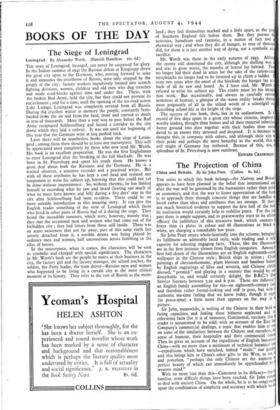BOOKS OF THE DAY
The Siege of Leningrad
THE story of Leningrad, besieged, can never be surpassed for glory. In the Indian summer of 1941 the Russian defeat at Kingisepp threw the great city open to the Germans, who, moving forward to seize it and announce the overthrow of Russia, were only stopped by the people of the city : factory workers impulsively formed into scratch fighting divisions, women, children and old men who dug trenches and made road-blocks against time and under fire. These, with the broken Red Army, held the city, but they could not prevent its encirclement ; and for a time, until the opening of the ice-road across Lake Ladoga, Leningrad was completely severed from all Russia. During the cruellest winter in memory the people, constantly bom- barded from the air and from the land, froze and starved to death in tens of thousands. More than a year was to pass before the Red Army recaptured Schlfisselburg and forced a corridor to the city down which they laid a railway. It was not until the beginning of - this year that the Germans were at lass pushed back.
Later there will be numberless books about the siege of Lenin- grad ; among them there should be at least one masterpiece. This will be appreciated most completely by those who now read Mr. Werth. His book is an excellent preparation. He was the first Englishman to enter Leningrad after the breaking of the full blockade. He was born in St. Petersburg and spent his youth there. He knows a great deal about both the Russians and the Germans. He is a trained observer, a sensitive recorder and a practised writer. But with all these attributes he has kept a cool head and resisted any temptation to write his subject up, knowing that this could not yet be done without impertinence. So, without rhetoric, he has limited himself to recording what he saw and heard (leaving out much of what he must have known and felt) during a five days' stay in the city after Schliisselburg had been re-taken. There could be no more suitable introduction to this amazing story. It can give the English reader something of the view of Leningrad which those who lived in other parts of Russia had of it during the siege. They heard the incredible rumours, which were, however, mainly true ; they met the occasional men and women who had come out of the forbidden city ; they had letters from those still inside. There was an acute awareness that not far away, part of this same earth but utterly detached from it, a terrible drama was being played by ordinary men and women, half unconscious actors fumbling in the roles of heroes.
In the masterpiece, when it comes, the characters will be seen as symbolic and charged with special significance. The characters in Mr. Werth's book are the people he meets at their business in the city, the factory girl and the factory manager, the school teacher, the soldier, the Party leader, the tram driver—Russian men and women who happened to be living in a certain city at the most critical moment of its history. They refer to the rest of Russia as the main-
land; they feel themselves marked and a little apart, as the p of Southern England felt before them. But they pursue activities, humdrum and fantastic, in a matter of fact and rhetorical way ; and when they die of hunger, as tens of thou did, for them it is just another way of dying, not a symbolic ac sacrifice.
Mr. Werth was there in the early autumn of 1943. Altho the enemy still dominated the city, although the shelling .was and was to grow worse, the months of horror lay behind. Peo no longer hid their dead in attics for the sake of the ration-car steeplejacks no longer had to be fattened up to climb a ladder. even two years after the onset of the blockade the hunger lay at back of all he saw and heard. As I have said, Mr. Werth refused to write his subject up. The reader must let his ima tion work. But occasionally, and always in carefully recor sentences of hearsay, a glimpse of the worst reality breaks thro most poignantly of all in the stilted words of a schoolgirl es describing school-life at the height of the siege.
The success of this book, then, lies in its ordinariness. It it record of five days spent in a great city whose citizens, inspired worthy leaders, thought their homes and all their material inheri better ground into dust together with their bodies than su dered to an enemy they detested and despised. It is because thought this, in company with others, arid although their city their pride and perhaps the most beautiful in the world, that evil might of Germany has withered. Because of this. too, _splendour of St. Petersburg is now outshone.
EDWARD CRANRSHAW.


























 Previous page
Previous page